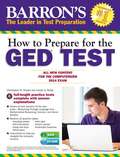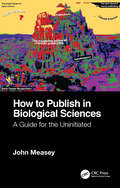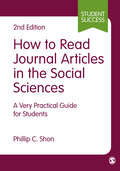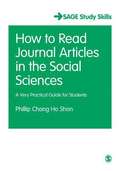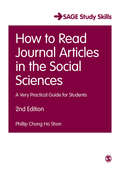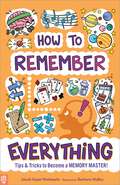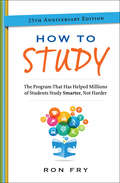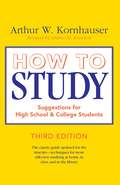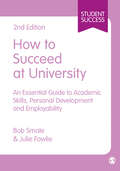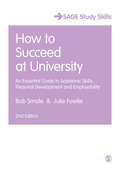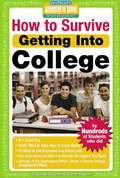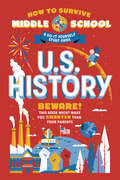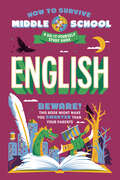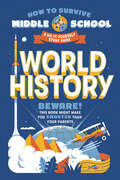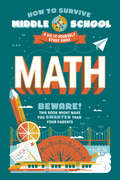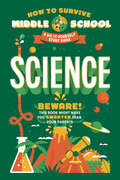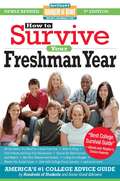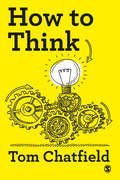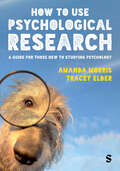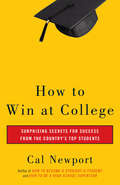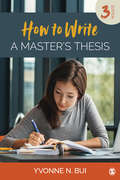- Table View
- List View
How to Prepare for the GED Test
by Christopher Sharpe Joseph ReddyThe 2014 GED exam has been revised extensively to reflect the world we live in today. The most noticeable change is that the test is now computer based--a transition that requires test-takers to have strong typing and computer skills. <P><P> The new exam covers additional topics in the Math and Science sections and includes "blended" subject matter within the sections, meaning test-takers will see science questions that require math to produce a numerical answer or social studies questions that require essay-writing skills and so forth. <P><P>Test-takers will also find all question types used on the new computer format. With such comprehensive changes in store for test-takers, it is fitting for Barron's to offer a book based on the 2014 exam. The new "How to Prepare for the GED Test" offers test-takers a guided approach to taking and passing the exam by building on the skills they already have. <P><P>Test-takers will benefit from the book's extensive subject reviews that cover all four of the new test sections: Social Studies Science Reasoning through Language Arts Mathematical Reasoning The book also includes diagnostic tests and two full-length practice exams with all questions answered and explained.
How to Publish in Biological Sciences: A Guide for the Uninitiated
by John MeaseyThis book is a guide specifically for Early Career Researchers on how to publish in the Biological Sciences, whether that be your first manuscript or if you’re already experienced – there’s something for everyone.Following on from How to Write a PhD in Biological Sciences: A Guide for the Uninitiated, it will guide you through taking your manuscript to publication in peer-reviewed journals and disseminating your research more broadly. It talks you through the peer-review process, including how to respond to reviewers’ comments, the meaning and importance of Impact Factors and how to get citations. It also explores the challenges in the academic community around Open Access and other debates, including transparency, overlay journals, paywalls, publication bias, predatory journals and the dangers of bullying.Whether you are a student just completing your studies, or a supervisor struggling with rejections, this book will provide the insider information you need to get ahead.
How to Read Journal Articles in the Social Sciences: A Very Practical Guide for Students (SAGE Study Skills Series)
by Phillip Chong Ho ShonThis superb guide teaches you how to read critically. Its no-nonsense, practical approach uses a specially developed reading code to help you read articles for your research project; this simple code enables you to decipher journal articles structurally, mechanically and grammatically. Refreshingly free of jargon and written with you in mind, it's packed full of interdisciplinary advice that helps you to decode and critique academic writing. The author's fuss free approach will improve your performance, boost your confidence and help you to: Read and better understand content Take relevant effective notes Manage large amounts of information in an easily identifiable and retrievable format Write persuasively using formal academic language and style. New to this edition: Additional examples across a range of subjects, including education, health and sociology as well as criminology Refined terminology for students in the UK, as well as around the world More examples dealing specifically with journal articles. Clear, focused and practical this handy guide is a great resource for helping you sharpen your use of journal articles and improve your academic writing skills. 'I have used the book over the last five years with my students with great success. The book has helped students to develop their critical thinking, reading and writing skills and when it comes to writing a dissertation they have used the code sheet in their own writing.' - Pete Allison, Head of the Graduate School of Education, University of Edinburgh SAGE Study Skills are essential study guides for students of all levels. From how to write great essays and succeeding at university, to writing your undergraduate dissertation and doing postgraduate research, SAGE Study Skills help you get the best from your time at university. Visit the SAGE Study Skills website for tips, quizzes and videos on study success!
How to Read Journal Articles in the Social Sciences
by Phillip Chong Ho Shon'Shon's writing is engaging and entertaining; he opens up the "black box" of academic reading and writing, explaining how to decode and critique formal scientific writing and systematically organize information gained from reading journal articles' - Dr Lorraine Whitmarsh, School of Psychology, University of Cardiff, UK 'Once the reader has mastered Philip Shon's codes and applied them to texts, it will become increasingly impossible not to write and critique with integrity. I thoroughly recommend this book' - Professor Helen Cowie, Faculty of Health and Medical Sciences, University of Surrey, UK Many texts provide tips for successfully writing theses, dissertations, and journal articles. All argue that writing is like any other skill - it has to be developed, taught, and practiced daily. The same is certainly true of academic reading, yet many advanced students have trouble with the essential skill of 'reading critically'. This handy guide teaches you how to read so you're able to maximize your output in the writing process, whether you're a student or early career researcher. The author's unique reading code teaches you how to approach social and behavioural science journal articles as texts that can be deciphered structurally, mechanically and grammatically. The strategies included allow you to systematize the reading, note-taking and organizing of voluminous amounts of information in an easily identifiable and retrievable format, which will be a huge confidence boost to anyone who struggles with this first phase in the writing process. This book is indispensable for social and behavioural science students and researchers worldwide wanting to sharpen their critical evaluative skills for better academic writing. Phillip C. Shon is an Associate Professor of Criminology at the University of Ontario Institute of Technology. SAGE Study Skills are essential study guides for students of all levels. From how to write great essays and succeeding at university, to writing your undergraduate dissertation and doing postgraduate research, SAGE Study Skills help you get the best from your time at university.
How to Read Journal Articles in the Social Sciences: A Very Practical Guide for Students (SAGE Study Skills Series)
by Dr Phillip C. ShonThis superb guide teaches you how to read critically. Its no-nonsense, practical approach uses a specially developed reading code to help you read articles for your research project; this simple code enables you to decipher journal articles structurally, mechanically and grammatically. Refreshingly free of jargon and written with you in mind, it’s packed full of interdisciplinary advice that helps you to decode and critique academic writing. The author’s fuss free approach will improve your performance, boost your confidence and help you to: Read and better understand content Take relevant effective notes Manage large amounts of information in an easily identifiable and retrievable format Write persuasively using formal academic language and style. New to this edition: Additional examples across a range of subjects, including education, health and sociology as well as criminology Refined terminology for students in the UK, as well as around the world More examples dealing specifically with journal articles. Clear, focused and practical this handy guide is a great resource for helping you sharpen your use of journal articles and improve your academic writing skills. ‘I have used the book over the last five years with my students with great success. The book has helped students to develop their critical thinking, reading and writing skills and when it comes to writing a dissertation they have used the code sheet in their own writing.’ - Pete Allison, Head of the Graduate School of Education, University of Edinburgh SAGE Study Skills are essential study guides for students of all levels. From how to write great essays and succeeding at university, to writing your undergraduate dissertation and doing postgraduate research, SAGE Study Skills help you get the best from your time at university. Visit the SAGE Study Skills hub for tips, resources and videos on study success!
How to Remember Everything: Tips & Tricks to Become a Memory Master!
by Jacob Sager Weinstein Odd DotHOW TO REMEMBER EVERYTHING is the ultimate guide to unlocking the power of your brain!Kids will learn how to ace history tests by memorizing dates, feel confident about remembering people's names, win card games by mastering entire decks, and hang on to happy memories for a lifetime.This invaluable memory guide for children is full of recall-building techniques, fun challenges, and hilarious art.
How to Study
by Ron FryThe bestselling How to Study (Seventh Edition) reveals the study skills that all students need to know in order to be successful, whether the goal is landing a top scholarship or excelling in school. This edition includes information on how to create an effective work environment, stand out in class, use the library, conduct research online, and much more. Plus, author Ron Fry covers all the traditional elements of a winning study strategy, such as reading, writing, time-management, memory, and test-taking skills. How to Study (Seventh Edition) introduces a revolutionary study system, along with examples, that gives students the edge in any learning environment.
How to Study: The Program That Has Helped Millions of Students Study Smarter, Not Harder (Ron Fry's How to Study Program #3)
by Ron FryThe bestselling guide that has helped millions of students study smarter, not harder—updated for today&’s classroom.How to Study reveals the study skills all students need to know to be successful, whether the goal is landing a top scholarship, excelling in school, or preparing to return to school. This edition includes information on how to create an effective work environment, stand out in class, conduct research online, and much more. Fry also covers all the traditional elements of a winning study strategy, such as reading, writing, time management, memory, and test-taking skills. How to Study introduces a revolutionary study system along with examples that give students the edge in any learning environment. How to Study also: Prepares students of all ages to excel in their classes by developing effective study skillsShows students, in a quick, easy-to-read style, the essential skills that can be applied outside the classroom and later in lifeIncludes study tips for teaching and studying with young children; advice for fighting mid-study fatigue and boredom; tips for in-class learning; and more
How to Study: Suggestions for High-School and College Students (Chicago Guides to Academic Life)
by Arthur W. KornhauserA complete guide for successful studying, How to Study is concise, practical, time-tested, and free of gimmicks. Designed originally for freshmen at the University of Chicago, this smart book has helped generations of students throughout the country improve their skills in learning quickly and effectively. It offers a no-nonsense plan of action filled with techniques, strategies, exercises, and advice for: *Mastering rather than just memorizing material *Learning the secrets of mental preparation before tackling difficult assignments or exams *Strengthening skills for better reading, note taking, and listening *Improving use of time in the classroom, the library, and at home It offers a wealth of advice, from the commonsensical ("Never begin study immediately after eating" and "Check every tendency to daydream") to the more psychological ("Use your knowledge by thinking, talking, and writing about the things you are learning"). Thoroughly revised and updated, this powerful little book can help any motivated and capable student work smarter, not just harder, from high school through college. When he wrote How to Study Arthur W. Kornhauser (1896-1990) was associate professor of business psychology at the University of Chicago.
How to Succeed at University: An Essential Guide to Academic Skills, Personal Development & Employability (SAGE Study Skills Series)
by Julie Fowlie Bob SmaleLecturers, request your electronic inspection copy here Achieve all your goals for university - whatever they are! How to Succeed at University provides straightforward, practical advice for anyone experiencing university life. Introducing the personal, academic and life skills you need to succeed - both at university and in today's competitive job market - you'll find help with managing your time and budget, and guidance on a range of study skills including skills for research and examination success. You'll also learn how to identify and develop key transferable skills that will stay with you throughout your professional life. Discover how to: Improve your employability prospects and give yourself the advantage in the job market Benefit from other students' experience, with top tips and insider advice on succeeding in your studies Explore the uses of digital technologies in learning and assessment Use what you learn right away, with handy downloadable checklists and worksheets. Pragmatic, up-front and sympathetic, this is an essential companion for all undergraduate students, as well as anyone preparing for study at university. SAGE Study Skills are essential study guides for students of all levels. From how to write great essays and succeeding at university, to writing your undergraduate dissertation and doing postgraduate research, SAGE Study Skills help you get the best from your time at university. Visit the SAGE Study Skills website for tips, quizzes and videos on study success!
How to Succeed at University
by Ms Julie Fowlie Mr Bob SmaleHow to Succeed at University is a uniquely comprehensive study skills and personal development guide, incorporating coverage of personal skills, academic skills and job search skills within the framework of personal development planning. All the key skills are covered, with a strong focus on the importance of the continuing personal development process and the ultimate goal of employability. In terms of personal skills, the book offers advice on handling stress, time management and developing interpersonal skills. The academic skills section concentrates on the skills crucial for learning effectively, carrying out research, writing up your work and tackling exams. The job search skills covered include discussion of how to identify the best job according to skill set and how to stand out in the applications and selection process. This book will be an essential companion for all undergraduate students, whatever their subject of study, and for those preparing for study at University. SAGE Study Skills are essential study guides for students of all levels. From how to write great essays and succeeding at university, to writing your undergraduate dissertation and doing postgraduate research, SAGE Study Skills help you get the best from your time at university.
How to Succeed at University: An Essential Guide to Academic Skills, Personal Development & Employability (SAGE Study Skills Series)
by Bob Smale Julie FowlieLecturers, request your electronic inspection copy here Achieve all your goals for university – whatever they are! How to Succeed at University provides straightforward, practical advice for anyone experiencing university life. Introducing the personal, academic and life skills you need to succeed - both at university and in today’s competitive job market – you’ll find help with managing your time and budget, and guidance on a range of study skills including skills for research and examination success. You’ll also learn how to identify and develop key transferable skills that will stay with you throughout your professional life. Discover how to: Improve your employability prospects and give yourself the advantage in the job market Benefit from other students' experience, with top tips and insider advice on succeeding in your studies Explore the uses of digital technologies in learning and assessment Use what you learn right away, with handy downloadable checklists and worksheets. Pragmatic, up-front and sympathetic, this is an essential companion for all undergraduate students, as well as anyone preparing for study at university. SAGE Study Skills are essential study guides for students of all levels. From how to write great essays and succeeding at university, to writing your undergraduate dissertation and doing postgraduate research, SAGE Study Skills help you get the best from your time at university. Visit the SAGE Study Skills hub for tips, resources and videos on study success!
How to Survive Getting into College
by Rachel KornHundreds of students share their hard-won wisdom, thoughts, strategies, struggles, and even failures. Filled with tips, tricks, humor, and horror stories, as well as practical advice on applications, interviews, and financial aid, the book is a lifeline for high school juniors and seniors.
How to Survive Middle School: A Do-It-Yourself Study Guide (HOW TO SURVIVE MIDDLE SCHOOL books)
by Rebecca Ascher-Walsh Annie ScavelliBEWARE—THIS BOOK MIGHT MAKE YOU SMARTER THAN YOUR PARENTS! Navigate the wilderness of middle school U.S. History with this hands-on, comprehensive study guide for 6th-8th graders!This highly illustrated, handy field guide makes learning an adventure inside and outside of the classroom. Study with helpful illustrations, detailed tables, diagrams, and maps, essential vocabulary lists, and expert knowledge presented in a fun, bold, and easy-to-understand format. Explore and master topics like: • Native American Peoples • European Colonies • Declaration of Independence • Civil War • Industrial Revolution • World Wars I & II • The Great Depression • The Cold War • Civil Rights • The Vietnam War • The War on Terror • and more! The How to Survive Middle School study guides cover essential middle school subjects with interactive texts, useful study techniques, and engaging illustrations that make information stick! The included reflective questions and write-in sections foster critical thinking and problem-solving skills, helping readers become independent learners. Each book is vetted by curriculum experts to perfectly complement middle school lesson plans. Other available subjects: World History, English, Math, and Science.
How to Survive Middle School: A Do-It-Yourself Study Guide (HOW TO SURVIVE MIDDLE SCHOOL books)
by Nina CiattoBEWARE—THIS BOOK MIGHT MAKE YOU SMARTER THAN YOUR PARENTS! Navigate the wilderness of middle school English with this hands-on, comprehensive study guide for 6th-8th graders!This highly illustrated, handy field guide makes learning an adventure inside and outside of the classroom. Study with helpful illustrations, annotated excerpts, writing prompts, essential vocabulary lists, and expert knowledge presented in a fun, bold, and easy-to-understand format. Explore and master topics like: • Grammar and Roots of Language • Metaphors, Symbols, & other Literary Devices • Types of Fiction and Nonfiction • Textual Analysis • Sources and Evidence • Tone and Voice • Narrative Themes • and more! The How to Survive Middle School study guides cover essential middle school subjects with interactive texts, useful study techniques, and engaging illustrations that make information stick! The included reflective questions and write-in sections foster critical thinking and problem-solving skills, helping readers become independent learners. Each book is vetted by curriculum experts to perfectly complement middle school lesson plans. Other available subjects: World History, Math, Science, and U.S. History.
How to Survive Middle School: A Do-It-Yourself Study Guide (HOW TO SURVIVE MIDDLE SCHOOL books)
by Elizabeth M. FeeBEWARE—THIS BOOK MIGHT MAKE YOU SMARTER THAN YOUR PARENTS! Navigate the wilderness of middle school World History with this hands-on, comprehensive study guide for 6th-8th graders!This highly illustrated, handy field guide makes learning an adventure inside and outside of the classroom. Study with helpful illustrations, detailed tables, diagrams, and maps, essential vocabulary lists, and expert knowledge presented in a fun, bold, and easy-to-understand format. Explore and master topics like: • Ancient Civilizations • The Middle Ages and the Renaissance • The Industrial Revolution and the Age of Enlightenment • Imperialism and Colonization • World Wars I & II • The Postwar World and the Digital Age • Climate Change • and more! The How to Survive Middle School study guides cover essential middle school subjects with interactive texts, useful study techniques, and engaging illustrations that make information stick! The included reflective questions and write-in sections foster critical thinking and problem-solving skills, helping readers become independent learners. Each book is vetted by curriculum experts to perfectly complement middle school lesson plans. Other available subjects: English, Math, Science, and U.S. History.
How to Survive Middle School: A Do-It-Yourself Study Guide (HOW TO SURVIVE MIDDLE SCHOOL books)
by Concetta Ortiz Matt FazioBEWARE—THIS BOOK MIGHT MAKE YOU SMARTER THAN YOUR PARENTS! Navigate the wilderness of middle school Math with this hands-on, comprehensive study guide for 6th-8th graders!This highly illustrated, handy field guide makes learning an adventure inside and outside of the classroom. Study with helpful illustrations, detailed tables, diagrams, and graphs, essential vocabulary lists, and expert knowledge presented in a fun, bold, and easy-to-understand format. Explore and master topics like: • Fractions and Decimals • Ratio and Proportions • Positive and Negative Integers • The Pythagorean Theorem • Solving Equations and Inequalities • Linear Relationships • Graphing Systems • Functions • Statistics and Probability • Area and Volume • and more! The How to Survive Middle School study guides cover essential middle school subjects with interactive texts, useful study techniques, and engaging illustrations that make information stick! The included reflective questions and write-in sections foster critical thinking and problem-solving skills, helping readers become independent learners. Each book is vetted by curriculum experts to perfectly complement middle school lesson plans. Other available subjects: World History, English, Science, and U.S. History.
How to Survive Middle School: A Do-It-Yourself Study Guide (HOW TO SURVIVE MIDDLE SCHOOL books)
by Rachel Ross Maria Ter-MikaelianBEWARE—THIS BOOK MIGHT MAKE YOU SMARTER THAN YOUR PARENTS! Navigate the wilderness of middle school Science with this hands-on, comprehensive study guide for 6th-8th graders!This highly illustrated, handy field guide makes learning an adventure inside and outside of the classroom. Study with helpful illustrations, detailed tables, diagrams, and charts, essential vocabulary lists, and expert knowledge presented in a fun, bold, and easy-to-understand format. Explore and master topics like: • The Scientific Method • The solar Systems • Fossil Fuels and Climate Change • The Periodic Table • Chemical Bonds • Ecosystems • Cells • Speed, Velocity, and Acceleration • Laws of Motion • and more! The How to Survive Middle School study guides cover essential middle school subjects with interactive texts, useful study techniques, and engaging illustrations that make information stick! The included reflective questions and write-in sections foster critical thinking and problem-solving skills, helping readers become independent learners. Each book is vetted by curriculum experts to perfectly complement middle school lesson plans. Other available subjects: World History, English, Math, and U.S. History.
How to Survive Your Freshman Year
by Frances Northcutt Yadin Kaufmann Ed.D. Scott Silverman Mark W. BernsteinHow to Survive Your Freshman Year offers incoming college freshmen the experience, advice, and wisdom of their peers: hundreds of other students who have survived their first year of college and have something interesting to say about it. Based on interviews with hundreds of college students at every type of higher-learning institution across the country, this book has insights on every aspect of college life, including, what to take to the dorm, living with roommates, Facebook and other social networks, extracurricular activities, choosing classes, studying, going abroad, finances, food, the social scene, doing laundry, staying in touch with friends and family, and much more. Highly readable, much of the book consists of short snippets with some interesting insight and advice from the college students interviewed. The book also includes expert input from college advisors and officers.
How to Think: Your Essential Guide to Clear, Critical Thought
by Tom ChatfieldThis is a book about thinking. Engaging and down-to-earth, it captures the habits and practices that are fundamental to clear thinking and effective study. In his warm and friendly style, Tom Chatfield shows you how to: Identify and examine your biases Engage in lively, curious skepticism See the value in emotion and use rhetoric persuasively Know when to say ′I don′t know′ Construct reasoned arguments and explanations Think critically about how you engage with technology. Short and punchy, the book views critical thinking as a skill to be continually practiced and developed. It equips you with a toolkit for clearer thinking, describing ten key concepts that help you to apply what you have learned. Including regular reflective exercises, key concepts, further readings, each chapter also offers recommendations for how to put the ideas it discusses into practice. This book is for undergraduate students and anyone looking to understand the core ideas behind critical thinking. Celebrating both self-reflection and collaboration, this book empowers you to pause, think twice and, above all, think well.
How to Think: Your Essential Guide to Clear, Critical Thought
by Tom ChatfieldThis is a book about thinking. Engaging and down-to-earth, it captures the habits and practices that are fundamental to clear thinking and effective study. In his warm and friendly style, Tom Chatfield shows you how to: Identify and examine your biases Engage in lively, curious skepticism See the value in emotion and use rhetoric persuasively Know when to say ′I don′t know′ Construct reasoned arguments and explanations Think critically about how you engage with technology. Short and punchy, the book views critical thinking as a skill to be continually practiced and developed. It equips you with a toolkit for clearer thinking, describing ten key concepts that help you to apply what you have learned. Including regular reflective exercises, key concepts, further readings, each chapter also offers recommendations for how to put the ideas it discusses into practice. This book is for undergraduate students and anyone looking to understand the core ideas behind critical thinking. Celebrating both self-reflection and collaboration, this book empowers you to pause, think twice and, above all, think well.
How to Use Psychological Research: A Guide for Those New to Studying Psychology
by Amanda Morris Tracey ElderKnowing how to find, analyse, and write about research papers is a foundational skill of your psychology degree that will set you up to ace your assessments. This book equips you with the skills, knowledge, and confidence to effectively use psychological research in your essays and reports. Using annotated examples and written in an accessible and interactive style that presumes no prior knowledge of psychology, it demonstrates how to glean exactly what you need from research papers to convey your points without getting side-tracked, allowing you to showcase your understanding of key concepts. How to Use Psychological Research is essential reading at the start of your degree and a useful guide for assessments throughout your studies. Amanda Morris is a Lecturer in Psychology at the University of Essex and an Associate Lecturer at the Open University. Tracey Elder is a Senior Lecturer and Staff Tutor at the Open University.
How to Use Psychological Research: A Guide for Those New to Studying Psychology
by Amanda Morris Tracey ElderKnowing how to find, analyse, and write about research papers is a foundational skill of your psychology degree that will set you up to ace your assessments. This book equips you with the skills, knowledge, and confidence to effectively use psychological research in your essays and reports. Using annotated examples and written in an accessible and interactive style that presumes no prior knowledge of psychology, it demonstrates how to glean exactly what you need from research papers to convey your points without getting side-tracked, allowing you to showcase your understanding of key concepts. How to Use Psychological Research is essential reading at the start of your degree and a useful guide for assessments throughout your studies. Amanda Morris is a Lecturer in Psychology at the University of Essex and an Associate Lecturer at the Open University. Tracey Elder is a Senior Lecturer and Staff Tutor at the Open University.
How to Win at College: Surprising Secrets for Success from the Country's Top Students
by Cal NewportThe essential guide to getting ahead once you&’ve gotten in—proven strategies for making the most of your college years, based on winning secrets from the country's most successful students&“Highly recommended because it is full of practical tips that will help high school grads take the next step in life.&”—MoneyHow can you graduate with honors, choose exciting activities, build a head-turning resume, gain access to the best post-college opportunities, and still have a life? Based on interviews with star students at universities nationwide, from Harvard to the University of Arizona, How to Win at College presents seventy-five simple rules that will rocket you to the top of your class. These often surprising strategies include:• Don&’t do all your reading• Drop classes every term• Become a club president• Care about your grades, Ignore your GPA• Never pull an all-nighter• Take three days to write a paper• Always be working on a &“grand project&”• Do one thing better than anyone else you knowProving you can be successful and still have time for fun, How to Win at College is the must-have guide for making the most of these four important years—and getting and edge on life after graduation. &“This deliberately provocative book is a good way for a smart student to see how out-of-the-box thinking can lead to success in college.&”—Seattle Times
How to Write a Master′s Thesis
by Yvonne N. Bui"This is the best textbook about writing an M.A. thesis available in the market." –Hsin-I Liu, University of the Incarnate Word The Third Edition of How to Write a Master′s Thesis is a comprehensive manual on how to plan and write a five-chapter master’s thesis, and a great resource for graduate students looking for concrete, applied guidance on how to successfully complete their master′s degrees. While research methods and statistics courses may teach students the basic information on how to conduct research, putting it all together into a single project and document can be a challenge. Author Yvonne Bui demystifies this process by integrating the language learned in prerequisite methods and statistics courses into a step-by-step guide for developing a student′s own thesis or project.
